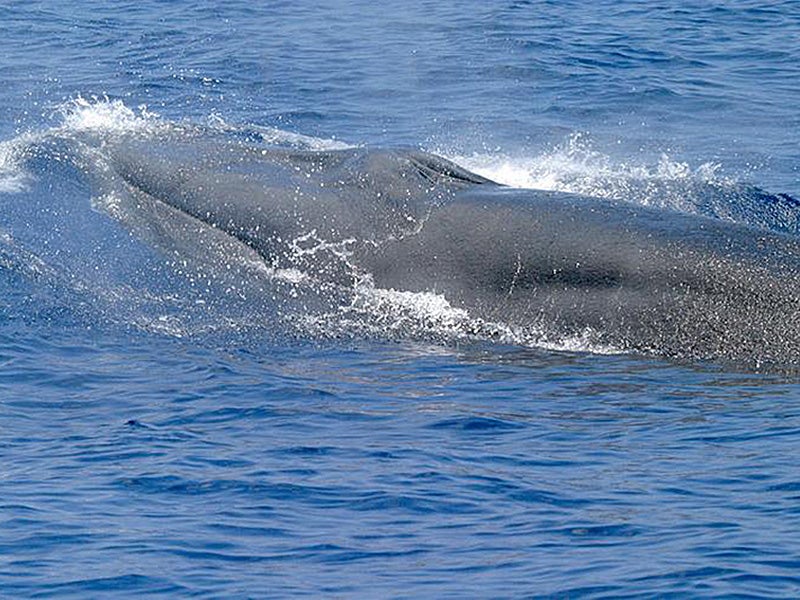Gulf Whale: Species in the Spotlight
The federal National Oceanic and Atmospheric Administration has added the critically endangered Gulf of Mexico Rice’s whale to a de facto extinction watchlist. But we still need to do more to protect the species.
Bell bottoms were the fashion rage in 1975, when conservationists kicked off the first “Save the Whales” movement to halt commercial hunting of one of the most awe-inspiring creatures on Earth.
Here we are, nearly 50 years later, still trying to save our planet’s magnificent whales. Today’s critical goal: To carve out protections for perhaps the world’s rarest — the Gulf of Mexico Rice’s whale.
This elusive whale species — with fewer than 100 on Earth — was newly identified as a distinct species in 2021. At the end of 2023, we got news that the federal National Oceanic and Atmospheric Administration (NOAA) has added the Rice’s whale to a de facto extinction watchlist — an awareness program called “Species in the Spotlight” identifying 10 species that government scientists say need “immediate, targeted actions” to “stabilize the population and prevent extinction.” (The “Species in the Spotlight” listing is included in NOAA’s official Recovering Threatened and Endangered Species Report to Congress).
Gulf of Mexico Rice’s whales are the only whales whose known range is entirely within North America’s waters. They often use an unusual deep water feature called the DeSoto Canyon off the coast of Pensacola, Florida, but scientists have recently confirmed that they range all along the shelf break in waters 100-400 meters deep off of Texas, Alabama, Mississippi, and Louisiana and range as far as Mexico. Vessel strikes, oil-and-gas industrial activities, and oil spills are the greatest threats. Since they bask at night near the water’s surface, the large whales are especially at risk from ship strikes. As the audio from this National Public Radio story shows, the underwater blasting from oil and gas exploration interferes with their ability to communicate, find food and mates, and rear their young.
Gulf of Mexico Rice’s whales are so endangered, the National Marine Fisheries Service concluded that losing even a single breeding female could collapse the population. In a letter to the Biden administration, over 100 scientists warned that unless the U.S. does more to protect the whales, we could witness the first human-caused extinction of a great whale species.
While the whale is getting more attention, that has not yet translated to meaningful action to protect the species. Unfortunately, last year NOAA declined an emergency rulemaking petition from Earthjustice and other conservation partners seeking to create a slow-speed zone to protect Rice’s whales in the industrialized Gulf. Even more troubling, the Interior Department offered millions of acres of underwater exploration and drilling leases in the whales’ habitat to oil and gas companies, which will result in more oil rigs sprinkled throughout the Gulf and more ship traffic to service those rigs.
Earthjustice is working with clients and partners Healthy Gulf, the Natural Resources Defense Council, Defenders of Wildlife, Center for Biological Diversity, Sierra Club, Friends of the Earth, and Turtle Island Restoration Network inside and outside the courtroom to push for legal protections for Rice’s whales.
In one ongoing legal case, Earthjustice filed suit in 2020 to challenge the Trump administration’s official biological opinion governing the effects of oil and gas activity on imperiled species in the Gulf of Mexico. Among other things, the flawed biological opinion dismisses the likelihood of another catastrophic oil spill like the BP disaster — which killed or seriously harmed more than 100,000 animals protected under the Endangered Species Act, and killed approximately 20% of the Gulf of Mexico Rice’s whales. It had taken a decade for federal officials to update the previous biological opinion after the BP spill, and in the end, the National Marine Fisheries Service did not properly consider threatened and endangered species or their ecosystems during the evaluation, violating the provisions of the Endangered Species Act.
Although the Biden administration has acknowledged that the 2020 biological opinion is flawed, rare Gulf Rice’s whales and other imperiled wildlife need protections now, while the government works to fix it. That’s especially true because the oil industry continues as if nothing is amiss; running ships through whale habitat, drilling deeper than ever before, and blasting seismic airguns in search of more and more oil. But if nothing else, shining the “Spotlight” on Rice’s whales makes clear that business as usual is “almost certain” to cause extinction.
Putting these imperiled whales on an official NOAA concern list is a positive step, but we need more than that. We need concrete protections to keep Gulf of Mexico Rice’s whales from going extinct on our watch.
Earthjustice’s Oceans Program uses the power of the law to safeguard imperiled marine life, reform fisheries management, stop the expansion of offshore oil and gas drilling, and increase the resiliency of ocean ecosystems to climate change.
